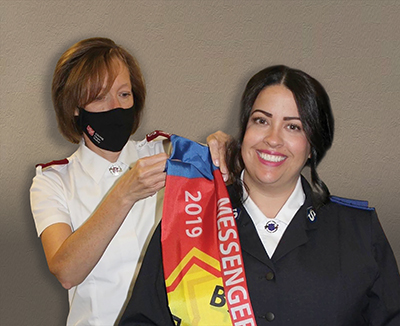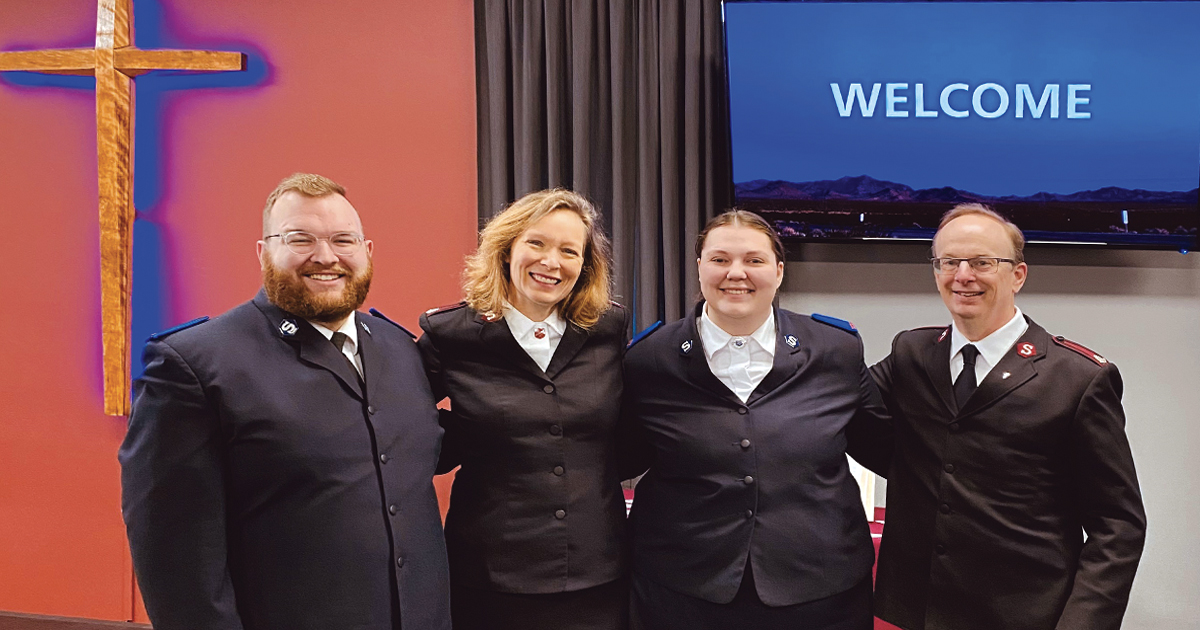(above) Mjr Corinne Cameron counts it a privilege to journey with cadets as they train to become Salvation Army officers. From left, Cdt Zach Marshall, Mjr Cameron, Cdt Julia Marshall and Mjr Steven Cameron, theological formation co-ordinator, CFOT. The Marshalls were commissioned with the rank of lieutenant last month
We have just celebrated the commissioning and ordination of the Messengers of Reconciliation. As the assistant training principal at the College for Officer Training, it is my privilege to journey with these special individuals as they become Salvation Army officers. It invites me to consider what it means for me to be an officer. What is my theology of officership?
Called
I grew up in The Salvation Army with parents who are now retired officers. Throughout my teens, well-meaning people told me, “You’ll be an officer one day.” With each of these proclamations, I felt a strong internal no. I said to God, “I will be anything but an officer.”
However, when I was 18, I attended an international congress, where I knelt at a cross on the floor of the Royal Albert Hall in London, England, and said yes. Then life (and my desire to have a forever home) caused me to take a different path. I went off to university and had a great time, but a persistent unsettledness accompanied me. One day, my dad asked, “Do you think you cannot settle on what you want to do because you are resisting a call to officership?” With this question I began to realize that God was calling me, and I was not just acquiescing to what I thought everyone else expected of me.
Officers are people called by God, but what does that mean? First, being called is a personal relationship between ourselves and God. The Bible shows how God calls people, each in their own way, to extend God’s kingdom here on earth. Some examples are:
- Moses was going about his everyday duties, tending his father-in-law’s sheep, when God called to him from a burning bush.
- Samuel, a child who served Eli the high priest, was called while he was asleep.
- Saul (Paul) was on the way to Damascus, with a clear personal agenda, when God interrupted and called him.
In church history, God called John Wesley following a worship time, and he felt his heart strangely warmed. A little more than 100 years later, while William Booth walked by an open-air meeting, God gave him his destiny.
A second understanding of being called is that officership is not just any job—it is a vocation. The verb “to call” comes from the Latin root vocatio. That same root gives us the word vocation, which describes the core purpose of our lives. Officership weds the core purpose of our lives to our day-to-day output. There are times when officership is hard; there are times when it is discouraging. But when we live it out as our vocation, even when the surface demands are tough, we know that in our obedience to God’s call we are held in the palm of God’s hand.
A third understanding of being called is our willingness to step into the unknown. One of my struggles in accepting a call to officership was that I wanted the “known.” Yet, when I consider the story of Abram and Sarai, I see their calling distinctively linked with leaving the known for the unknown: “The Lord said to Abram, ‘Leave your country, your relatives, and your father’s home, and go to a land that I am going to show you’ ” (Genesis 12:1 GNT).
Being called means following in obedience where God directs our paths. All Abram and Sarai were told was that God would eventually show them where, but their initial yes was a statement of faith, trusting God without knowing the road map.
Covenanted
One beautiful aspect of journeying with cadets is being present when they kneel at the mercy seat to sign their Officer’s Covenant. This covenant indicates a sacred relationship that we enter with God. Our covenant is a commitment, a promise of how we will live as officers. It is signed with the awareness that we strive to uphold our promise only through God’s grace, empowered by the Holy Spirit.
Covenants are a dominant biblical theme and the foundation of the story of God’s people. In the second account of creation, we read of the Edenic covenant, when the Lord God places Adam in the Garden of Eden to work and take care of it (see Genesis 2). A little later in Genesis, we read of the Noahic covenant, when God promises to never again destroy the earth with a flood and sets a rainbow in the clouds to be a sign of the covenant between God and the earth (see Genesis 9).
A few chapters later, we begin to encounter the covenants that establish Israel as God’s people when God promises Abram (later Abraham): “I will make you into a great nation, and I will bless you; I will make your name great, and you will be a blessing. I will bless those who bless you, and whoever curses you I will curse; and all peoples on earth will be blessed through you” (Genesis 12:2-3).
Following the exodus from Egypt, the Mosaic covenant is given, with the famous Ten Commandments (see Exodus 20), and the priestly covenant began, with a sacred tabernacle and a forgiveness system through sacrifice.
In 2 Samuel, we read of the Davidic covenant, when God promises to “establish the throne of his kingdom forever” (2 Samuel 7:13). In the exile, we encounter the new covenant, with the promise that God’s law will be written directly on human hearts (see Jeremiah 31:33). In Jesus, we see both the Davidic and the new covenants fulfilled.
The Salvation Army Officer’s Covenant stands on the shoulders of these covenants. I embrace the last line of our covenant—“by God’s grace”—because I cannot live up to my covenant in my own strength. Yet God loves us so much that he forgives us when we slip and empowers us to follow his call to live out his covenant.
Throughout the Old Testament, people fail to live up to their part of the covenant. Adam and Eve eat the fruit; Noah struggles significantly following the trauma of the flood; Moses does not make it into the Promised Land; and the list goes on. But rather than be defeated, this shows us that God calls and uses ordinary people, forgives and restores these ordinary people and empowers these ordinary people.
We don’t know where our Officer’s Covenant will lead us. We don’t know who we will meet on the journey. But we do know that, by God’s grace, we will be empowered to live out our covenant to see and serve God’s people, all the days of our lives.

Mjr Corinne Cameron helps Lt Amber Wareham prepare for the commissioning and ordination service in 2021
Committed
As I consider my theology of officership, I realize that in addition to being called and covenanted, officers are also committed. We are committed to God, we are committed to the families that God gives us and we are committed to God’s work in The Salvation Army. This commitment involves daily surrender and transformation.
In our lives as officers, there are some days when we can see God at work; days when we participate in a harvest for some of our hard work. However, there are many days when we are asked to surrender, trust and wait. There are days when we get discouraged or hurt, when we might want to just give up. Yet, by the grace of God and the power of the Holy Spirit, we are able to remain committed. Habakkuk 3:17-19 says: “Though the fig tree doesn’t bloom, and there’s no produce on the vine; though the olive crop withers, and the fields don’t provide food; though the sheep are cut off from the pen, and there are no cattle in the stalls; I will rejoice in the Lord. I will rejoice in the God of my deliverance. The Lord God is my strength (CEB).”
As we follow God’s call, as we covenant to journey with him and his saving message, we are invited to remain committed to him—to wait for him and on him. One of the things I enjoy the most at an officers’ gathering is when we pause for the roll call. We stand, and we hear the names of the faithful and committed officers God has called home. The part I love the most is that it says the years, months and days of how long they served, and the end date is the day that they died. For even though an officer retires from active service, an officer keeps on serving, keeps giving their talent to God and keeps loving God’s people. They heard God’s call, entered into a covenant, a sacred relationship with God, and they remained committed.
Major Corinne Cameron is the assistant training principal at the College for Officer Training in Winnipeg.
This story is from:










You have make my day with these wards of encouragement Major I say thank you and God continue to give you more wisdom as you always in encouraged us w, these wards.